Focal point
Location
The Center for International Forestry Research (CIFOR) is a non-profit, scientific facility that conducts research on the most pressing challenges of forest and landscapes management around the world. With our global, multidisciplinary approach, we aim to improve human well-being, protect the environment, and increase equity. To do so, we help policymakers, practitioners and communities make decisions based on solid science about how they use and manage their forests and landscapes.
Capacity building, collaboration and partnerships are essential to finding and implementing innovative solutions to the challenges that the globe faces. We are proud to work with local and international partners. We are a member of the CGIAR Consortium and lead the CGIAR Research Program on Forests, Trees and Agroforestry.
Our headquarters are in Bogor, Indonesia. We have offices in 8 countries across Asia, Latin America and Africa, and we work in more than 30 countries. Contact us for more information.
Resources
Displaying 56 - 60 of 808Reshaping the Terrain: Landscape Restoration in Ethiopia
With 22 million hectares, Ethiopia by far made the largest pledge to restore its degraded lands under the African Forest Landscape Restoration Initiative (AFR 100). In this fact sheet, restoration efforts are presented including major approaches, key constraints and enabling conditions and steps to achieve FLR in the country.
Reshaping the terrain: Forest landscape restoration efforts in Ghana
As one of the key partners of the African Forest Landscape Restoration Initiative (AFR 100), Ghana is committed to restore 2 million hectares of its land by 2030. In this factsheet, the major approaches to forest landscape restoration are outlined and enabling conditions as well as major constraints to forest landscape restoration elaborated.
Reshaping the terrain: Landscape restoration in Tanzania
Although Tanzania looks back onto a long history of land degradation, it has seen significant restoration efforts even before the African Forest Landscape Restoration Initiative (AFR 100) was launched. Building on this experience, the fact sheet highlights the main landscape restoration approaches employed in the country and elaborates on the major constraints as well as enabling conditions for FLR.
Reshaping the terrain Forest and landscape restoration in Cameroon
In 2017, Cameroon committed to restore forests and degraded lands over more than 12 million hectares across all ecosystems by 2030 as part of the African Forest Landscape Restoration Initiative (AFR 100). The fact sheet elaborates on the status of the commitments made and highlights key restoration efforts and major constraints to FLR in practice.
Reshaping the terrain: Forest and landscape restoration in Kenya
The Mau Forest Complex forms the largest closed canopy forest ecosystem in Kenya and is an asset of great national and regional importance. The complex supports a wide range of environmental services crucial for the socioeconomic development of the region. Despite its critical importance in sustaining current and future economic development, the forest has been adversely affected by extensive illegal, irregular and ill-planned settlements, in addition to illegal forest resources extraction.







